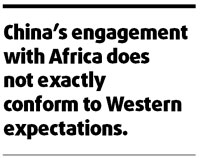Ties create options for Africa
Updated: 2008-02-27 07:26
Robust cooperation between China and Africa has provided a range of benefits to African countries since 1956.
Some flagship projects include the 1,860 km Tanzania-Zambia railroad, the Port of Friendship in Mauritania and the International Convention Center in Cairo.

China has signed loan framework agreements on favorable terms with more than 20 countries. It offers scholarships to 21,000 students from 50 African countries.
To help Africans fight disease, China promised at the 2006's China-Africa Summit to help set up 30 malaria treatment and prevention centers on the continent.
Most African countries now have formal diplomatic ties with China.
In international affairs, there has been equally close cooperation between China and Africa. The most profound symbol that has helped to define the relationships was China assuming its seat in the UN in 1971, where 26 African countries cast affirmative votes to make it possible.
The Forum for China-Africa Cooperation (FOCAC), established in 2000, has now become a key institutional mechanism through which China coordinates its activities in Africa.
In the life of the FOCAC, its most important summit took place in Beijing in November 2006. At that meeting China made even deeper commitments, such as a pledge to double its assistance to Africa by 2009.
Although China's trade with Africa makes up only 3 percent of its global total, the volume increased by 700 percent in the 1990s, nearly doubled between 2000 and 2004 and was estimated to surpass $70 billion last year.
Chinese investors have established 800 business ventures in 49 African countries in a wide spectrum of activity. Tourism is another growth sector.
However, given the growing presence of Chinese people across Africa, language and cultural barriers are becoming increasingly prominent, if not divisive.
These considerations now invite a reflection on the broader systemic issues that underlie China's emergence on the global stage.
In the last twenty years, China has achieved remarkable and breathtaking economic success in its quest for modernization and retained an instinctive apprehension of the US in its international relations.
It is not surprising that China remains suspicious of a uni-polar world dominated by the US.
In such an "anarchic" environment, a country like China will tend to balance its position against the dominance of the hegemonic zero-sum game of winners and losers.
As Yong Deng and Thomas G Moore has written in The Washington Quarterly, "China's new role of globalization in transforming great power politics from the unmitigated struggle for supremacy of earlier eras to a more cooperative form of interstate competition that increase prospects for China's peaceful rise".
China's economic and political development has profound implications for every region in a world of global interdependence.
Economically, China's reform and open up has exposed it to the world of commerce and investment opportunities on an unprecedented scale, and the world is probably better off for its market-led growth and innovations and efficiencies in production methods.
On the other hand, China has 1.3 billion people, so the logical line would be that China should not be contained, but encouraged to become a responsible global citizen.
Vincent Cable and Peter Ferdinand have argued that "for economic, environmental and security reasons alike, a major priority is now to bring China into the center of global, as well as regional, governance into an institutional arrangement which recognizes that, within a short space of time, China is beginning to matter as much for the rest of the world as Japan, the EU or the US".
For these reasons, China needs a peaceful global environment to advance its economic modernization program and to address its own myriad domestic challenges and reform imperatives as a developing country.
What would make more sense would be for countries to cooperate more intensively in key areas international relations, diplomacy and trade that advance global peace, stability and prosperity.
The proper basis for an assessment of China's role in Africa should not be the realpolitik and sterile shibboleths of the "China threat", but rather dynamic of its "peaceful rise".
Former Chinese President Jiang Zemin proposed Five Principles that should underpin China's relations with Africa. A simple prism through which this can be viewed is to contrast the "Washington Consensus" with the "Beijing Consensus".
The former emerged out of the new-liberal orthodoxy that helped to define the Reaganite and Thatcherite approaches to globalization, characterized by the promotion of unfettered markets, trade liberalization and free societies. These continue to be the markers of America's global hegemony.
China, on the other hand, has insisted on stability as the foundation of its foreign policy, informed by the values of the five principles: sincerity, equality and mutual benefit, non-interference, solidarity and common development.
While the Washington Consensus bears all the hallmarks of the "end of history" arrogance, the Beijing Consensus is at heart developmental, with an emphasis on the economic, social and cultural. In many ways, it marks a shift from the politics of power to the politics of morality.
China's engagement with Africa does not exactly conform to Western expectations. However, its ability to compete effectively with other extra-regional actors provides new economic opportunities and development options for Africa.
The author is executive director of Institute for Global Dialogue, Midrand, South Africa The article was first published in the Foreign Affaris Journal sponsored by the Chinese People's Institute of Foreign Affairs
(China Daily 02/27/2008 page9)
|
|
|
|
|
|